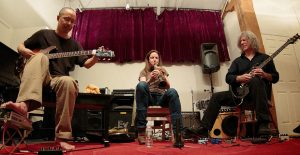
A couple of years ago, I was introduced to Catherine Sikora’s playing thanks to the album “Anomic Aphasia“. Two tracks featured Sikora with guitarists Han-earl Park and Nick Didkovsky, or Eris 136199 when taken all together: “…a cyclic frenzy of fragmented sounds without an ounce of entropy,” if I’m allowed to quote myself!? Not very coincidentally, the new, eponymous Eris 136199 album is out on 9th October, pre-ordering now on Bandcamp… Then there’s the opportunity (hint, hint!) to delve deeper in Sikora’s other projects, which include collaborations with Eric Mingus and Stanley Zappa, the Beowulf-inspired “untitled: after” with Brian Chase, and her solo work. There are plenty of leads to pursue in the following 7 answers…
1. Name an experience that contributed to your becoming a musician?
One day when I was a kid I was walking in the countryside near where I grew up, in the Southwest of Ireland. There was a metal tubular gate, the usual type for this area, and it was singing in the wind. The air was creating tones and overtones where there were holes in the tubing of the gate. The sound was eerie and I was electrified. At the time I don’t think I realized it, but that keeps on coming back to me as a moment where I started to understand that music can be much more than anything I had experienced before.
2. Who or what are you listening to at the moment?
Right now I am revisiting some works by Morton Feldman. I’ve also had Bell Trove Spools by John Butcher in heavy rotation, and Matana Roberts’ Coin Coin Chapter Three. I am a very slow listener, I will spend weeks with one recording, so it takes me a while to get through what I want to hear.
3. What’s the balance of preparation vs. improvisation for the average live set or recording?
It’s all about the preparation, for me! The saxophone is such a demanding instrument that if I am not totally prepared, in good shape to physically manage the instrument, then the improvisation will be negatively affected. The act of merely producing a good tone requires daily work, there is no escape, and I love that about the instrument. Practice is what I do every day, regardless of whatever else is happening, because the skill of playing is 100% perishable*. The more prepared I am for a performance, the more freedom I have to execute my ideas.
* Apparently, this beautiful concept of a ‘perishable skill’ originally came from a conversation with a Special Forces sniper – common ground is wherever you find it…
4. What are your non-musical influences?
Poetry has always been a major inspiration to me, and has been the basis of several of my projects. I also get inspired when I encounter somebody doing a deep dive into a subject, no matter what it may be. When I see someone exploring their subject to the greatest possible depth, zooming in on it, that makes me happy and inspires me to do more of the same with my own work. I love to visit museums, especially to see ancient art. The drive to produce a thing of beauty, to create an imaginative work that is separate from the work of surviving, is a quality that transcends time and makes me love humanity.

5. What qualities do you look for in a collaborator?
Openness. Listening. Commitment to and mastery of their instrument. The confidence to be on stage or in a session and not have to play all the time. Willingness to explore.
6. Where do you stand on the streaming/downloading/file-sharing/musicians-not-getting-paid-for-their-music debate?
We have got to figure something out, musicians must get paid, if we as a society want musicians to be able to keep on producing quality work. I wish I had a solution, clearly the rates paid by the streaming services to musicians are abysmally low, and that needs to change. I like Bandcamp because they allow the creator to take control of their work, and their model is very fair.
7. If money and time were no object, what would your next project be?
I am working on writing much more music right now, and would love to have the luxury of spending a substantial amount of time working with one group—time to rehearse, and then to do a generous amount of touring. So often rehearsal is done in the minimum of time, and tours are very brief. I feel that if I had, say, six months to work consistently with one group of people, and the chance to do lots of performance as well as rehearsal, that would be the greatest possible opportunity for growth. The group itself would probably be a sextet or septet, nothing too big, and the luxury of time is perhaps the most important component.
–
www.catherinesikora.com
…and on Bandcamp
Cover pic from the Improvised Music Company (IMC) website




5 thoughts on “7 Questions for… Catherine Sikora”